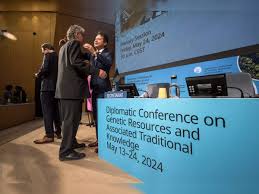WIPO Treaty:

WIPO member states approved a historic new Treaty on intellectual property (IP), genetic resources (GR), and traditional knowledge (TK), following decades of negotiations.
- It Ensures traditional knowledge is not exploited without permission or compensation.
- Utilization: Genetic resources and traditional knowledge are often used in patented inventions and scientific research.
- The Treaty marks the first WIPO Treaty to include provisions for Indigenous Peoples and local communities.
- Patent applicants must disclose the country of origin or source of GR and the Indigenous Peoples or local community that provided the associated TK.
- Any WIPO member state can join.
- The treaty does not apply to patents filed before its entry into force.
About WIPO:
- The World Intellectual Property Organization (WIPO) was established in 1967 through the WIPO Convention, transforming the earlier United International Bureau for the Protection of Intellectual Property (BIPRI) into WIPO.




